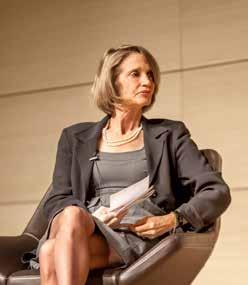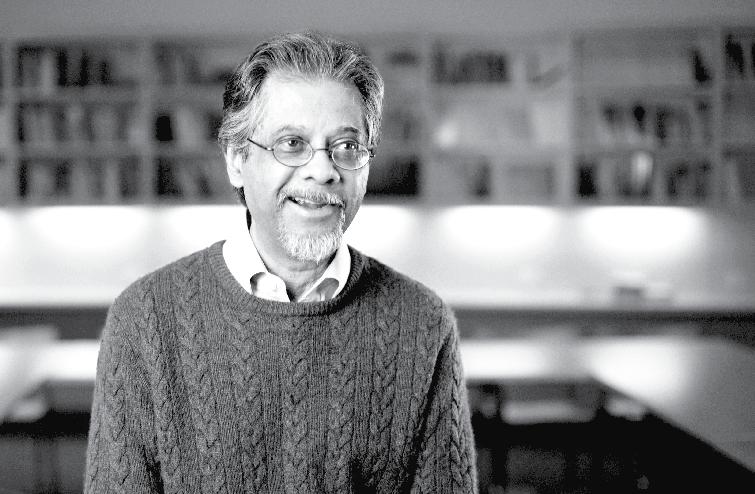
10 minute read
Economics
from 2020 NSSR Viewbook
I. OVERVIEW
II. DIALOGUES



Economics Overview
Engage in an informed, critical, and passionate investigation of the economic foundations of contemporary society. The Department of Economics at The New School for Social Research (NSSR) offers a graduate program that places Robert Heilbroner’s “worldly philosophy” at the heart of its curriculum. Students learn about a range of economic theories, including Keynesian and post-Keynesian economics; the classical political economy of Smith, Ricardo, and Marx; structuralist and institutionalist approaches to economics; and neoclassical economics. They also acquire a comprehensive understanding of conceptual, mathematical, and statistical modeling techniques used in economic research. Coursework emphasizes the relationship between the history of economic ideas, contemporary economic policy debates, and conflicting interpretations of economic phenomena.
Along with completing their coursework, students in the Department of Economics engage in research on topics reflecting their own interests and shaped by their interactions with professors throughout the university. The Department of Economics fosters intellectual inquiry that leads to practical solutions to contemporary problems and poses new questions for study. Recent research topics include:
Statistical equilibrium models Political economy of cooperation and coordination Problems of regulating and guiding economic development Measuring the role of race and ethnicity in occupational hierarchies Modeling housing market behavior, income distribution, and wealth concentration The Schwartz Center for Economic Policy Analysis (SCEPA) conducts research that complements the work of the Department of Economics, with a focus on retirement equity, and offers students opportunities to pursue original research.
Degrees Offered
The Department of Economics offers MA, MS, and PhD degrees in Economics and an MA in Global Political Economy and Finance. Students who complete MA and MS requirements with sufficient distinction may be considered for admission to PhD study. In rare cases, the department grants direct PhD admission to applicants who have completed a comparable MA in Economics at another institution.
Recent Courses
Economics, Ethics, and Political Theory Labor Economics Crisis and Austerity Economics of Climate Change Inequality and Varieties of Capitalism
Recent Outcomes
Ibrahim Shikaki (PhD ’19): Assistant Professor, Trinity College Ingrid Harvold Kvangraven (PhD ’18): Lecturer, University of York (UK) Katherine Moos (PhD ’17): Assistant Professor, University of Massachusetts–Amherst Jermaine Toney (PhD ’17): Assistant Professor, Rutgers University Degaulle Adili (MA ’16): Vice President of Technology, Nomura Audra Aucoin (MA ’16): Grant Manager, Institute for New Economic Thinking Danielle Kavanagh-Smith (MA ’16): Senior Program Manager, NYC Department of Small Business Services

Political Economy Creates a Bond Between Duncan Foley and His Students
Duncan Foley Leo Model Professor of Economics
To reach Guggenheim Prize winner Duncan Foley’s office, you must first wade through the students diligently at work outside his door. Foley maintains a oneon-one independent study relationship with his students, helping MA candidates conduct independent research and PhD candidates transform their personal study and paper assignments into thesis research. In addition, Foley has co-authored six published papers with students and recently co-authored a book, the second edition of Growth and Distribution (Harvard University Press, 2019), with two NSSR PhD alumni, now economics professors. The relationships he fosters aren’t a one-way street, however. According to Foley, he learns a great deal from working with his students, particularly on methodological issues. “They often know much more about what they’re studying—for example, the economics of India or the economics of commodity markets—than I do, so I learn indirectly from them.”
Foley began his research more than 40 years ago in an attempt to introduce money into non-Marxian general equilibrium theory. After losing interest in economics due to the narrowness of the neoclassical mainstream, Foley began to read more Marx and other classical political economists. This new research sparked his interest in political economy, an interest he has maintained through today as he continues to work on integrating money into the Marxian and Smithian system. Naturally, Foley infuses political economy into his teaching, incorporating a healthy dose of the history of ideas and history of economics into his courses. This method allows him to present contending ideas, points of view, and schools of thought, which make for a better intellectual environment for students. Through his and his colleagues’ efforts, the NSSR economics department has become one of the few places in the world that teaches political economy in such a thoughtful and rigorous manner.
The reputation of NSSR economics students extends far beyond the campus. Foley notes that visiting professors often remark how much they enjoy teaching at The New School because the students are not intimidated and can carry on a free intellectual dialogue with the faculty. Foley states that prospective students should be intellectually curious, willing to question perceived doctrine and hold rigorous debates. Alumni exemplifying these traits have gone on to hold high-ranking financial positions in foreign countries and thus influence macroeconomic policy. Others have become research directors in labor unions, local and national government, and think tanks, influencing various social policies including pensions, retirement, and discrimination.
A Conversation on Worker Benefits and Pay with Teresa Ghilarducci


Teresa Ghilarducci Irene and Bernard L. Schwartz Professor of Economics and Policy Analysis
[00:00:00.00] Interviewer: Can you describe your general research interests as well as your intellectual trajectory? What are you doing now, and what do you want to do in the future?
[00:00:20.24] Teresa Ghilarducci: I have always been interested in jobs, people, pay, and power. In economics that is called labor economics. I aim to change the core curriculum on how to understand wages, unemployment, and compensation— especially paid time off—pensions and health care. I am fascinated with the interaction of workplace employee benefit plans and the larger issues of the government’s responsibility in maintaining the economy and maintaining equity in the labor market. Those topics frame almost all of my research questions. Specifically, I am working on two problems. One is, Will the proletarianization of older workers lower the wages, hours, and working conditions of young and older workers through increased competition? The research question is, What happens when older people have to work more because they don’t have pensions? How will older people working more affect their own bargaining power and the bargaining power of others? The second problem is the way older workers are being used in the economy. We have a number of hunches about how they might be used. One might imagine a happy scenario in which older workers are used in places where their wisdom and experience can help other workers. Or seniority rights move them into easier physical jobs. Or they get the respect that older people need and deserve in the workplace. But the other possibility is that they’re being put in secondary jobs and in secondary, subordinated positions. Either is possible, as is some place in between. I’m looking at data and other evidence to decide whether older workers are being treated well or poorly and what function they have in the capitalist system.
[00:03:29.21] IN: NSSR has a tradition of interdisciplinary work and heterodox education. How does that apply to the way you teach or the way you conduct research?
[00:03:45.11] TG: At other universities, scholars might view the problems of diminished pensions through the lens of individual choice and people not saving enough. But at The New School, we know that an individual is just one part of the explanation of how things work. We recognize that individuals are embedded in groups and groups are sorted into economic classes, and society and politics determine how much influence each class has. So I don’t place the blame for the lack of security for older people with the individual worker; I see the outcome as part of a set of power relationships. That’s very much in the New School tradition.
The way NSSR’s traditions inform my teaching is that almost all my students are engaging with some public policy question. They see their work as having to be accountable to their society. I’m grateful to be in the academy, and I have a responsibility to the public for being given this very protected and responsible job. I pass that sentiment on to my students.
[00:06:31.16] IN: How would you describe the way you work with graduate students? What would you want to say to prospective students to encourage the right students to want to come here and study?
[00:07:01.15] TG: I get to know my students, and I listen carefully to what their backgrounds are and what kinds of skills they want to develop. If I have highly quantitative students, I’ll understand they are frustrated because they don’t know how to write. I also have students who read voraciously, but obviously want to be able to manipulate data and learn from the numbers evidence. I have a hypothesis that all students want to be balanced and have one area in their development that they feel needs to be enhanced. That’s where coming from scholarship about labor and human resource development really helps. I can identify gaps in student development and help students bridge those gaps. Any good union or any good unionized firm would do the same thing.
I will have students in their first year come with me or go themselves to a hearing or community group to explain economic concepts to the group. Public speaking is a very important aspect of this job. I’ll have students sit with me while I talk to reporters, so that they can understand what kinds of questions reporters ask.
I’m a real stickler for writing. Students are often shocked to find they have to buy a $4 copy of Deirdre McCloskey’s Economical Writing or Elements of Style.
[00:11:04.27] IN: What else would you say you would want prospective students to know about studying both here in the economics department and at NSSR as a whole?
[00:11:12.28] TG: Students have to be quite firm in managing their own time, in addition to knowing what resources they need. This place has the cultural norms of a lot of European universities—and not just of this century, but of centuries back. That is, if you come to study here, you need to be very motivated and interested in ideas. Students that come here are expected to be well-read, highly critical, and should have a thick skin about being challenged. They have to write every day. So having an identity of a writer is good, even if they come for economics. I would also add it’s important to be upfront about the help you need finding a job and a placement. [00:18:54.07] IN: I have one last question, about your work with the Schwartz Center for Economic Policy Analysis [SCEPA]. I know you have your independent lab, but can you just talk a little bit about your work with the Schwartz Center and whether it influences your teaching or your research?
[00:19:06.27] TG: I love my directorship of the Schwartz Center for Economic Policy Analysis because it’s where faculty can rise up out of their desks, stand on their own two feet, and push their ideas out into the world. It’s a conduit for the theoretical work that may be happening in our department to mainstream policymakers, or to existing advocacy groups. Oxfam needs to know how to reconceptualize the chronic deprivation of want. And through his research to reinterpret poverty rates in developing countries, my colleague Sanjay Reddy has shed new light on what deprivation means. Well, if the work stays on Sanjay Reddy’s desk or in academic articles, it doesn’t have the effect Sanjay Reddy intends. We stand to serve and to help facilitate and communicate our faculty research.
[00:20:14.00] IN: And in addition to faculty research, are there also opportunities for students to get involved?
[00:20:19.26] TG: Yes. Almost all the policy briefs and papers we are writing in the department and posting in SCEPA as working papers have student co-authors. I haven’t published anything without a student co-author for a long time.









